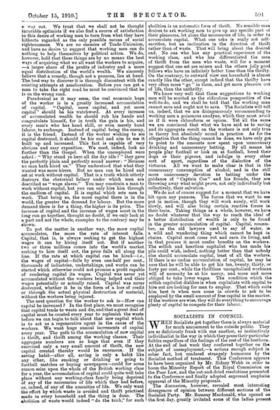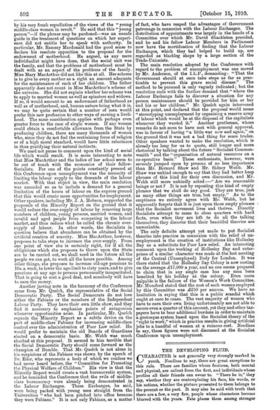SOCIALISTS IN COUNCIL.
WHEN Socialists get together there is always material for much amusement to the outside public. They are so deliciously frank with one another, so instinctively individualist in the way in which they press their particular foibles regardless of the feelings of the rest of the brethren. At the end of last week they conferred together on the subject of unemployment,—a serious enough subject in sober fact, but rendered strangely humorous by the Socialist method of treatment. This Conference appears to have been organised by Mr. Sidney Webb in order to boom the Minority Report of the Royal Commission on the Poor Law, and. the cut-and-dried resolutions presented to the Conference and finally adopted expressed emphatio approval of the Minority proposals. The discussion, however, revealed most interesting divergences of opinion between different sections of the Socialist Party. Mr. Ramsay Macdonald, who opened on the first day, greatly irritated. some of the ladies present by his very frank repudiation of the views of the "young middle-class woman in revolt." He said that this "young person"—if the phrase may be pardoned—was an unsafe guide in the treatment of questions on which her experi- ence did not entitle her to speak with authority. In particular, Mr. Ramsay Macdonald had the good sense to declare his resolute opposition to the proposal for the endowment of motherhood. He argued, as any mere individualist might have done, that the social unit was the family, and that the problems of motherhood must be dealt with as an aspect of the problems of the family. Miss Mary MacArthur did not like this at all. Her scheme is to give to every mother as a right an amount adequate for the maintenance of each of her children. The father apparently does not count in Miss MacArthur's scheme of the universe. She did not explain whether her scheme was to apply to married women as well as spinsters and widows.
If so, it would amount to an endowment of fatherhood as well as of motherhood, and, human nature being what it is, we may be quite certain that a number of men would prefer this new profession to other ways of earning a liveli- hood. The same consideration applies with perhaps even greater force to the case of single women. If any woman could obtain a comfortable allowance from the State by producing children, there are many thousands of women who, since they do not feel the restraining force of religion or of a high moral standard, would have little reluctance in thus gratifying their natural instincts.
We need not pause to comment upon the kind of social life which would result. It is more interesting to note that Miss MacArthur and the ladies of her school seem to be out of touch with the economics of their fellow- Socialists. For one of the points constantly pressed at this Conference upon unemployment was the necessity of limiting the labour supply to the demands of the labour market. With that object in view, the main resolution was amended so as to include a demand for a general limitation of the hours of labour on the express ground that this would create more opportunities for employment.
Other speakers, including Mr. J. A. Hobson, supported the proposals of the Minority Report on the ground that it would reduce the over-supply of labour by removing large numbers of children, young persons, married women, and invalid and aged people from competing in the labour market, and thus reduce what he called the chronic over- supply of labour. In other words, the Socialists in question believe that abundance can be obtained by the artificial creation of scarcity. Miss MacArthur, however, proposes to take steps to increase the over-supply. From one point of view she is certainly right, for if all the obligations which she proposes to throw upon the State are to be carried out, we shall need in the future all the people we can get, to work all the hours possible. Among other things, she proposes to increase old-age pensions to 10s. a week, to lower the age-limit to sixty years, and to give pensions at any age to persons permanently incapacitated. That is going to cost a good deal, and somebody will have to earn the money.
Another jarring note in the harmony of the Conference came from Mr. Quelch, the representative of the Social Democratic Party. The Social Democrats do not love either the Fabians or the members of the Independent Labour Party. They have their own little show, and they find it necessary to emphasise points of antagonism whenever opportunities arise. In particular, Mr. Quelch regards the Minority Report as a subtle device on the part of middle-class Fabians for increasing middle-class control over the administration of Poor Law relief. He would prefer to maintain the old Boards of Guardians elected on a democratic basis. Mr. Webb was much shocked at this proposal. It seemed to him terrible that the Social Democratic Party should come forward as the champion of Bumble. That Mr. Quelch is not alone in his suspicions of the Fabians was shown by the speech of Dr. Eder, who represents a body of which we confess we had never heard before, the "Committee for Promoting the Physical Welfare of Children." His view is that the Minority Report would create a vast bureaucratic system, and he reminded the Conference that the evils of middle- class bureaucracy were already being demonstrated in the Labour Exchanges. These Exchanges, he said, were being packed with young men straight from the Universities "who had been pitched into office because they were Fabians." It is not only Fabians, as a matter of fact, who have reaped the advantages of Government patronage in connexion with the Labour Exchanges. The distribution of appointments was largely in the hands of a. Committee over which Mr. David Shackleton presided, and he and his fellow Labour Members in Parliament now have the mortification of finding that the Labour Exchanges, which they had helped to build up, are regarded as blackleg shops by a large section of the Trade-Unionists.
The main resolution adopted by the Conference with regard to the problem of unemployment was one moved by Mr. Anderson, of the I.L.P., demanding : "That the Government should at once take steps as far as prac- ticable to prevent this grave social disease." The method to be pursued is only vaguely indicated; but the resolution ends with the further demand that "where the Labour Exchange fails to discover a situation for any person maintenance should be provided for him or her and his or her children." Mr. Quelch e intervened at this point, and declared that the proposal would mean "stereotyping unemployment by organising a reserve army of labour which would be at the disposal of the capitalists whenever they wanted it." Another gentleman, whose remarks do not seem to have met with general approval, was in favour of having "a little war now and again," on the ground that it was not a bad thing for some trades. Other speakers wanted to make the resolution, which is already too long for us to quote, still longer and more rhetorical by talking about the future " Socialist Common- wealth" and the "organisation of natural resources on a co-operative basis." These enthusiasts, however, were severely jumped upon by persons of no less importance than Mr. Bernard Shaw and Mr. Sidney Webb. Mr. Shaw was unkind enough to say that they had better keep phrases of this kind for their own discussion, and Mr. Webb still more unkindly asked :—" Are we reasonable beings or not ? It is not by repeating this kind of empty phrases that we shall do any good. They are true, just as many other things are true, but empty." As to the emptiness we entirely agree with Mr. Webb, but he apparently forgets that it is just upon these empty phrases that the Socialist movement lives and thrives. Directly Socialists attempt to come to close quarters with hard facts, even when they are left to do all the talking themselves, they discover that their beautiful theories are unworkable.
The only definite attempt yet made to put Socialist theories into practice in connexion with the relief of un- employment is the creation of institutions like Hollesley Bay as a substitute for Poor Law relief. An interesting comment upon the working of Hollesley Bay and enter- prises of a similar character was made at the last meeting of the Central (Unemployed) Body for London. It was there stated that the Hollesley Bay Colony is now costing on the average £17,000 a year, and no one seems prepared to claim that in any single case has any man been benefited by his holiday at the colony. Even more palpable is the failure of the Women's Work Committee. Mr. Mumford stated that the cost of each woman employed by this Committee was £250 per annum. We have no hesitation in saying that this is a public scandal which ought at once to cease. The vast majority of women who have to earn their own living unfortunately are not able to secure even a quarter of this amount, yet they and other tax- payers have to bear additional burdens in order to maintain a grotesque system based upon the Socialist theory of the "right to work," which in practice results in giving artificial jobs to a handful of women at a ruinous cost. Needless to say, these figures were not discussed at the Socialist Conference upon unemployment.















































 Previous page
Previous page